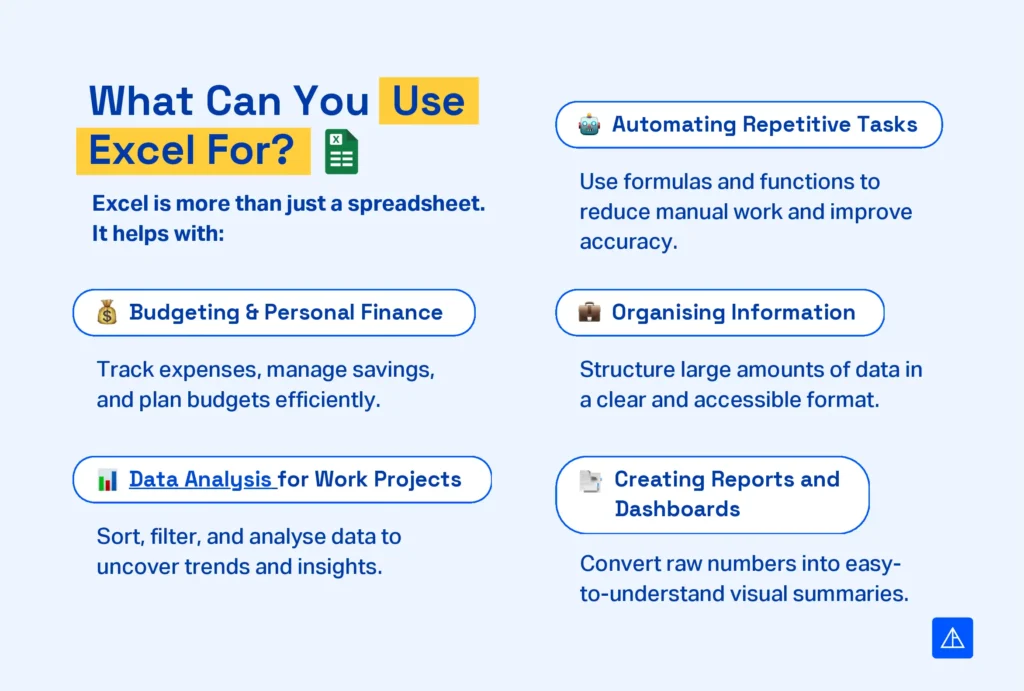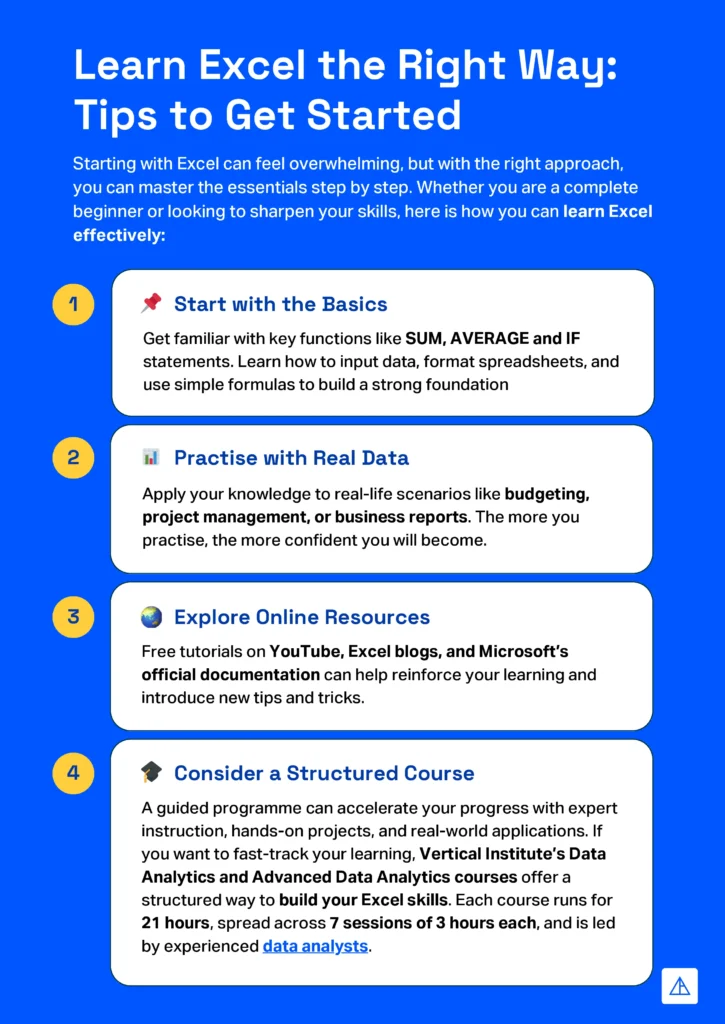Microsoft Excel is everywhere. You have probably heard of it and used it at work, in school, or for personal tasks. It is more than just a spreadsheet tool. It is a powerful skill that can make your job easier, improve efficiency, and open new career opportunities.
You might associate Excel with endless rows and columns, but it is much more than that. It helps businesses, professionals, and students manage data, perform calculations, and create meaningful reports. Excel is an essential tool for working with financial figures, tracking project timelines, and analysing business trends.
But where do you start? If you have ever stared at a blank spreadsheet wondering what to do next, you are not alone. Learning Excel does not have to be complicated or overwhelming. With the right approach, you can start using it effectively in no time.
Let’s break it down so you can learn Excel with confidence.
Related Article: How Advanced Excel Training Enhances Your Professional Toolkit
What Is Microsoft Excel?
Microsoft Excel is an essential tool for businesses and individuals and is widely used for organising data, calculating, and creating visual reports.
What Can You Use Excel For?
Excel is more than just a spreadsheet. It helps with:
- Budgeting and personal finance – Track expenses, manage savings, and plan budgets efficiently.
- Data analysis for work projects – Sort, filter, and analyse data to uncover trends and insights.
- Automating repetitive tasks – Use formulas and functions to reduce manual work and improve accuracy.
- Organising information – Structure large amounts of data in a clear and accessible format.
- Creating reports and dashboards – Convert raw numbers into easy-to-understand visual summaries.
At first glance, Excel may seem overwhelming with its hundreds of features. But once you understand the basics, such as formulas, tables, and charts, it can become a powerful tool that saves you time and effort.

Why Do So Many People Use Excel?
Excel remains one of the most widely used software applications across industries because it can:
✅ Organise information efficiently – Whether it is a simple to-do list or a complex financial report, Excel structures data in a way that is easy to read and analyse.
✅ Perform powerful calculations – With hundreds of built-in functions, Excel can handle anything from basic arithmetic to advanced financial modelling.
✅ Turn numbers into insights – Charts, graphs, and pivot tables help visualise trends and patterns, making data-driven decisions easier.
✅ Automate repetitive tasks – Features like formulas, macros, and conditional formatting can reduce manual work and improve productivity.
✅ Work for almost any industry – Finance, marketing, healthcare, education, logistics, and many other sectors rely on Excel for data management and analysis.
CAREER QUIZ SINGAPORE
Discover your work personality, ideal work partner, and earning potential.
Why Should You Learn Excel?
No matter your profession or background, learning Excel is a valuable skill. Here’s why:
- Boost your career – Jobs across industries such as finance, marketing, and operations require Excel knowledge. Employers value candidates who can manage data efficiently.
- Save time with automation – Simple functions like VLOOKUP and PivotTables can replace hours of manual work.
- Make informed decisions – Analysing trends through charts and data insights helps in strategic planning.
- Use it beyond work – Track expenses, plan projects, or even manage your side business with Excel.
Related Article: Best Excel Functions For Data Analysis
Learn Excel the Right Way: Tips to Get Started

Starting with Excel can feel overwhelming, but with the right approach, you can master the essentials step by step. Whether you are a complete beginner or looking to sharpen your skills, here is how you can learn Excel effectively:
Start with the basics 📌
Familiarise yourself with key functions like SUM, AVERAGE, and IF statements. Build a strong foundation by inputting data, formatting spreadsheets, and using simple formulas.
Practise with real data 📊
Apply your knowledge to real-life scenarios such as budgeting, project management, or business reports. The more you practise, the more confident you will become.
Explore online resources 🌍
Free tutorials on YouTube, Excel blogs, and Microsoft’s official documentation can help reinforce your learning and introduce new tips and tricks.
Consider a structured course 🎓
A guided programme can accelerate your progress with expert instruction, hands-on projects, and real-world applications. If you want to fast-track your learning, Vertical Institute’s Data Analytics and Advanced Data Analytics courses offer a structured way to build your Excel skills. Each course runs for 21 hours, spread across 7 sessions of 3 hours each, and is led by experienced data analysts.
These beginner-friendly courses cover Excel fundamentals, SQL, and Tableau, giving you a well-rounded foundation in data analytics. With expert guidance and practical exercises, you will gain real-world skills for your career.
Data Analytics Course
Turn data to practical insights Using SQL, Excel & Tableau.
Advanced Data Analytics
Master advanced Excel, SQL, Tableau with industry experts.
Related Article: Excel Course Duration: How Long It Takes to Learn Excel
More Questions About Getting Started with Excel
No, Excel is beginner-friendly. It is widely used by professionals across different industries, even those without technical backgrounds.
Yes, having a solid foundation in Excel makes it easier to transition into data analytics. Many data analytics courses, including the Vertical Institute, teach the basics and advanced Excel as part of the curriculum.
Yes! Various subsidies can help offset the cost of learning Excel. In Singapore, you may be eligible for:
SkillsFuture Credits (for Singaporeans aged 25 and above)
NTUC UTAP (for NTUC members)
IBF Funding (for finance professionals)
Company-sponsored training
COURSE SUBSIDY CALCULATOR
Discover how much you can save on Vertical Institute’s courses.
Yes! Many companies invest in employee training to enhance productivity and efficiency. If Excel is relevant to your role, your employer can fully or partially sponsor your course. If your organisation wants to upskill employees with Excel and data analytics training, connect with our admissions team to learn more about corporate training options at Vertical Institute.
Conclusion
Mastering Excel is about improving efficiency, making data-driven decisions, and opening doors to new career opportunities. Whether you want to streamline your workflow, analyse data with confidence, or advance in your profession, Excel is a skill that will always be in demand. The most effective way to learn Excel is to begin with the basics, practise consistently, and apply your knowledge to real-world scenarios. With so many free resources and structured learning paths available, now is the perfect time to build your Excel skills. Take the first step today, and see how Excel can simplify your work and enhance your career.
Join Our Free Workshops & Events
FREE WORKSHOPS
Explore our free workshops and uncover the skills you need to succeed.



